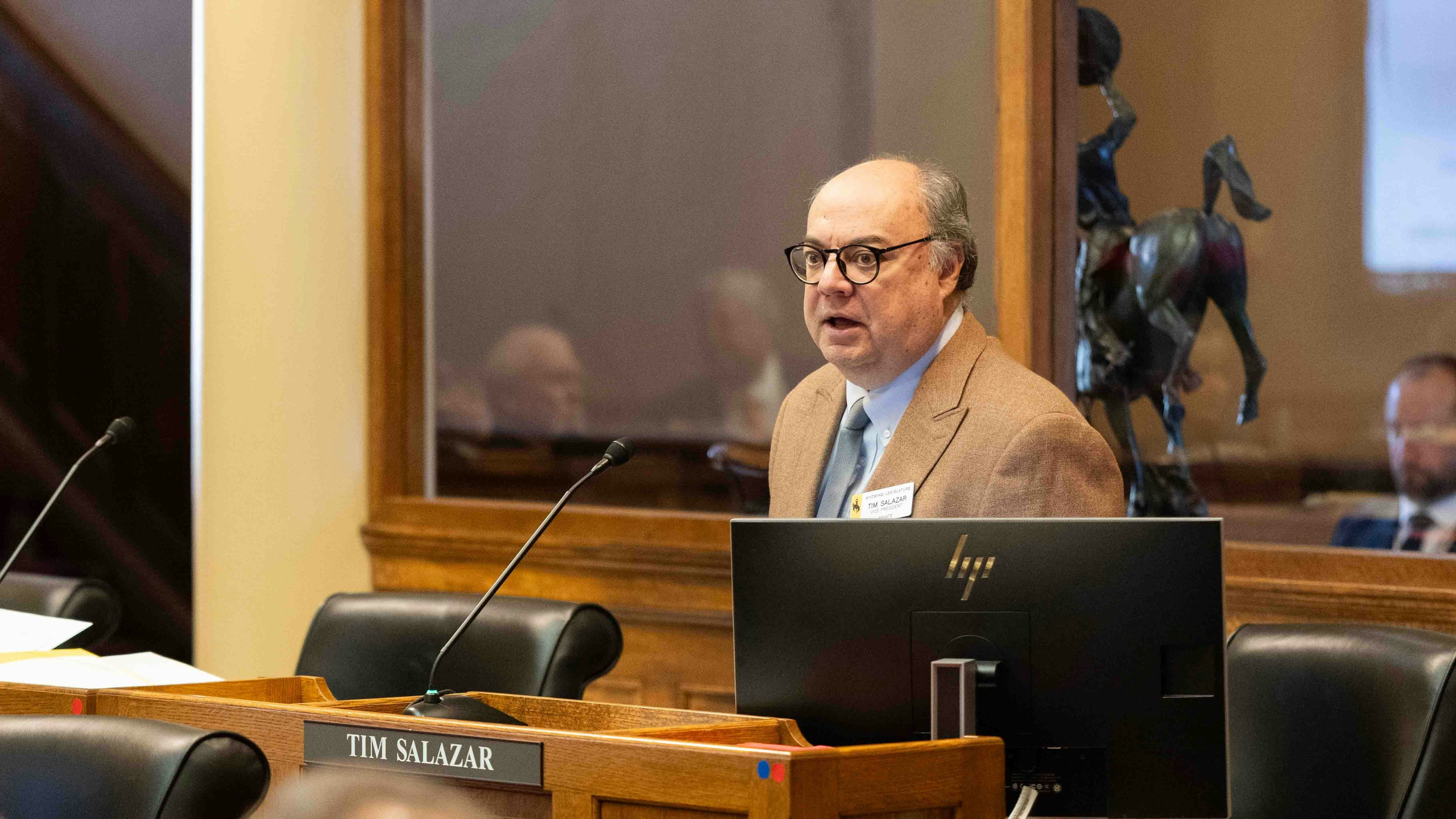The case of a Uinta County man accused of using an artificial intelligence application to remake a photo of a teenage girl he knows into child pornography resurrects some lawmakers’ concerns about AI deception.
The case of Matthew John McDowell, who turns 47 this year, rose Tuesday to the felony-level Uinta County District Court.
McDowell faces four counts of child pornography possession — each charged as a “subsequent offense” to prior child sexual exploitation and each punishable by between seven and 12 years in prison and up to $10,000 in fines.
Of the four photographs underpinning the four counts, at least one is a deepfake, court documents say.
The original, unaltered photograph was of a teen girl McDowell knows, fully wrapped in a towel from her upper chest to her feet, with her hair wet as though she had just gotten out of the shower, says an evidentiary affidavit by Wyoming Division of Criminal Investigation Special Agent Daniel Allison.
The altered version showed her naked and bore the words “AI generated” in its center, with the application’s name in the upper left corner of the image, wrote Allison.
The affidavit describes the other three photos underpinning the charges as child pornography involving a prepubescent girl depicted in lone sex acts and a sex act with an adult male. The document does not assert that these are deepfakes.
But, seemingly as an aside, it says investigators found “at least nine files of computer-generated imagery or animation” produced from original photos of a teen girl McDowell knows.
Allison’s account says investigators found deepfake-generating applications on one of McDowell’s devices.
One of these applications touts its ability to “swap faces in adult videos using cutting-edge AI technology … achieving a flawless, lifelike effect,” says the document.
Jon Gerard, McDowell’s attorney, declined Wednesday to comment.
Maybe Time For A Second Look
Wyoming has not passed a standalone law banning deepfake fraud, though some lawmakers tried without success to run that kind of legislation in 2024.
Rep. Mike Yin, D-Jackson, had voted in favor of the deepfake fraud bill when the Select Committee on Blockchain, Financial Technology and Digital Innovation advanced it in the 2023 interim, he told Cowboy State Daily in a Wednesday interview.
That bill didn’t focus on child pornography or deepfake porn. It sought to target AI image fraud generally, by making people flag deceptive-yet-realistic images that had been altered. The bill’s enforcement mechanism was a private lawsuit avenue, for anyone misled by deceptive AI images.
It also sought to authorize criminal prosecution of people caught using deepfakes to sway elections.
On hearing of McDowell’s case, Yin said it might be time to review the issue again.
“I’ll be a little crude here, but it’s f***ed up that people do this sort of thing,” said Yin of the allegations. “And I mean, maybe we should continue to figure out whether we should have an additional offense for this.”
Yin said he’s glad justice is being sought in this case.
Rep. Rachel Rodriguez-Williams, R-Cody, confirmed late Wednesday that she’s co-sponsoring a bill by Rep. Jaymie Lien, R-Casper, to address this issue.
“The AI Innovation and Child Protection act (would give Wyoming) the tools to lead with both innovation and integrity,” wrote Rodriguez-Williams in a Wednesday text message, adding that the bill seeks to safeguard people and ensure Wyoming retains a competitive edge in the AI market.
The text of the bill was not available by press time.
DCI Says It’s Doing The Thing
DCI is “well aware of the capabilities Artificial Intelligence offers in the generation of Child Sexual Abuse Material and will investigate those cases in a similar fashion as traditional CSAM cases,” DCI Commander Ryan Cox wrote in a Wednesday email to Cowboy State Daily, which he said was the product of his conversation with ICAC Commander Ryan Hieb.
AI gives new ways to make computer-generated images that in the past may have used cut-and-paste tools.
“Regardless of the production method, DCI will apply the full scope of our investigative resources to these cases,” added Cox.
Allison’s affidavit makes a similar statement, pointing to Wyoming’s child-porn ban and its inclusion of “computer-generated” and “modified” imagery in its definition of the illegal material.
It’s unclear whether the U.S. Supreme Court would agree.
The high court addressed this issue before the AI era, in the 2002 case Ashcroft v. Free Speech Coalition. The court struck down as unconstitutional a federal ban on “virtual child pornography.”
“The argument that virtual child pornography whets pedophiles' appetites and encourages them to engage in illegal conduct is unavailing because the mere tendency of speech to encourage unlawful acts is not a sufficient reason for banning it,” says the case syllabus.
But, noted Blockchain Committee Co-Chair Sen. Chris Rothfuss, D-Laramie, the Uinta County case isn’t a perfect parallel to Ashcroft.
That’s because the victims of fraudulent deepfake pornography aren’t necessarily sex abuse victims, but they still suffer harm.
Ashcroft’s “virtual” images, conversely, weren’t realistic morphs of real people.
Lawmakers may need to discover what the harm to real people is and how to curb it without violating the First Amendment, Rothfuss said.
Rothfuss had championed the rejected deepfake bill, for which the legislature lacked an “appetite,” he said. That bill sought chiefly to curb deceptions that could sway an election.
Perhaps the legislature will remain “against being proactive” and not legislate in this space until AI image technology wreaks real, noticeable harms in Wyoming, he opined.
Go Carefully
The libertarian-leaning Blockchain Committee Co-Chair Rep. Daniel Singh, R-Cheyenne, had voted against the deepfake bill – not because of any pornography nexus but because he felt that its provision criminalizing some unflagged political speech went too far.
Though the bill sought to target outright deceptive images, Singh worried that it could be weaponized against satire or parody, which are protected under the First Amendment.
But, said Singh, the deepfake issue and the broader problems of people using others’ likenesses and data deserve thoughtful contemplation going forward.
“Some of the factors you have to think about with AI-generated porn include your right to your own likeness,” he said. “And that was a topic that I wanted to explore – and that we’re probably going to explore in the upcoming interim.”
Singh wants to do so in a way that protects children and preserves the right of free expression, he said.
He also said the deepfake issue is a reminder that data miners are compiling not just images, but location, behavior, communication and other data people feed into their phones and the internet, said Singh.
Whether parents want to avoid posting photos of their children online falls under their own discretion, he said, but data harvesting is “something to be aware of.”
"People do need to be cautious of what they look at on the internet and the type of interactions they have with the interface itself, because everything is being recorded," he said.
Clair McFarland can be reached at clair@cowboystatedaily.com.






